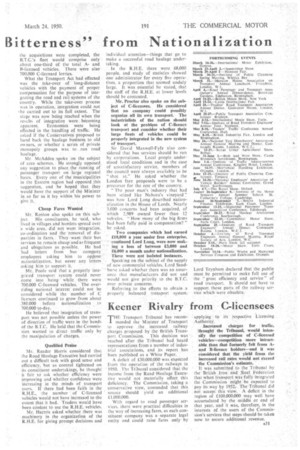Bitterness" from Nationalization
Page 33

If you've noticed an error in this article please click here to report it so we can fix it.
the acquisitions were completed, the B.T.C.'s fleet would comprise only about one-third of the total Aand B-licensed vehicles. There were also 700,000 C-licensed lorries.
What the Transport Act had effected was the take-over of long-distance vehicles with the payment of proper compensation for the purpose of integrating the road and rail systems of the country. While the take-over process was in operation, integration could not the carried out to its full extent. The stage was now being reached when the results of integration were becoming apparent. Economies were being effected in the handling of traffic. He asked if the Conservatives proposed to hand back the haulage business to old owners, or whether a series of pnivate monopoly groups was to run road haulage.•
Mr. McAdclen spoke on the subject of area schemes. He strongly opposed, any suggestion to place the running of passenger transport on large regional bases. Every one of the municipalities in the Eastern region had opposed this suggestion, and he hoped that they would have the support of the Minister in so far as it lay within his power to give it.
Cheap Fares Wanted Mr. Renton also spoke on this sub
ject. His constituents, he said, who lived in villages and hamlets spread over a wide area, did not want integration. co-ordination and the removal of disparities in fares. They want their bus services to remain cheap and as frequent and ubiquitous as possible. He had had letters from bus company employees asking him to oppose nationalization, but never any letters asking him to support it.
Mr. Poole said that a properly integrated transport system could never come into being' while there were 700,000 C-licensed vehicles. The overriding national interest could not be considered while the number of C licences continued to grow from about 380.000 before nationalization to 700,000 to-day.
He believed that integration of transport was not possible unless the power of direction of traffic were in the hands of the B.T.C. He held that the Commission wanted to direct traffic only by the manipulation of charges.
Qualified Praise
Mr. Reader Harris considered that the Road Haulage Executive had carried out a difficult task with good Sense and efficiency. but as control tightened on its constituent undertakings, he thought it fair to ask whether efficiency were improving and whether confidence were increasing in the minds of transport users. If there had been faith in the R,H.E., the number of C-licensed vehicles would not have increased to the extent that it had. Traders would have been content to use the R.H.E. vehicles.
Mr. Harrris asked whether there was machinery in the organization of the R.H.E. for giving prompt decisions and individual attention—things that go to make a successful road haulage undertaking.
In the R.H.E. there were 68,000 people, and study of statistics showed one administrator for every five operatives, a proportion that seemed unduly large. It was essential he stated, that the staff of the R.H.E. at lower levels should he contented.
Mr. Proctor also spoke on the subject of C-licensees. He considered that no company could possibly organize all its own transport. The industrialists of the nation should look at the problcm of C-licence transport and consider whether their large fleets of vehicles could be properly integrated in the new system of transport.
Sir David Maxwell-Fyfe also considered that bus services should be run by corporations. Local people understood local conditions and in the case of unsatisfactory service, members of the council were always available to be "shot at." He asked whether the London fare proposals were to be a precursor for the rest of the country.
" The poor man's industry that had been seized like Nahotu's vineyard 1' was how Lord Long described nationalization in the House of Lords. Nearly 3.000 concerns had been acquired, of which 2,989 owned fewer than 12 vehicles. " How many of the big firms had been fully paid in compensation?." he asked.
Two companies which had earned £10,000 a year under free enterprise, ' 'continued Lord Long, were. now mak
ing a loss of between £3,000 and
£6,000 a month under nationalization.
These were not isolated instances.
Speaking on the subject of the supply of new ccimmercial vehicles. Lord Sandhurst asked whether there was an assurance that manufacturers did not and would not give priority to the B.T.C. over private concerns.
Referring to the efforts to obtain a properly balanced transport system,' Lord Teynham declared that the public must be permitted to make full use of the " great efficiency and service" of road transport. It should not have to support those parts of the railway service which were obsolete,




























































































